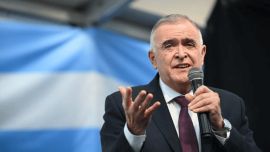The definition of alliances at the stroke of midnight on Wednesday simultaneously serves to simplify and complicate the electoral panorama. Simplify because there are only seven lists registered for August’s PASO primaries as against 11 in 2015 (who today remembers Mauricio Yattah?) – just one more than the six who cleared the PASO hurdle of 1.5 percent of the electorate to run in the last elections, thus showing this filter to be working ahead of time. These seven alliances also make for a neatly symmetrical spectrum – two on the far left, two on the far right and three much broader groupings disputing the middle ground between centre-right and centre-left. But the complications are, logically enough, far more complex.
Until now the battleground has been provincial elections (and will continue to be so tomorrow in Santa Fe, San Luis and Tierra del Fuego) with a strong case for arguing that this tail is wagging the dog in the formation of alliances. Both the leading tickets contain surprise ingredients which perhaps can only be explained as aimed at appealing to mostly Peronist provincial governors who had reasons for objecting to both. Most of these governors resisted backing a Cristina Fernández de Kirchner who drove all but seven provinces into deficit with her arbitrary federal revenue-sharing transfers and who openly despised traditional Peronism – placing Alberto Fernández at the head of the ticket supposedly removes that obstacle to supporting their own party. If all but four provinces are now in surplus, this is in considerable measure due to the Senate wheeling and dealing of President Mauricio Macri’s brand-new running-mate Miguel Ángel Pichetto, who accepted the surprise offer on Tuesday at once – not so surprisingly because if the American comedian W.C. Fields never met a drink he didn’t like, it would seem that Pichetto never met a president he did not like, judging from a quartercentury of parliamentary service to very different administrations.
By finally adding a Peronist wing to his coalition (now rebranded as Juntos por el Cambio), Macri thus opens up a new channel to the governors and indeed his original choice was reportedly one of their ranks – namely outgoing Salta Governor Juan Manuel Urtubey, who was last week’s other big surprise in abandoning his own presidential aspirations to become Roberto Lavagna’s running-mate in his Federal Consensus 2030 ticket. This alliance is not so much the product of any personal ambitions as the desperate need for their own candidate of the many businessmen who are so antagonised by policies obliging them to compete with the world and face corruption trials that they have problems seeing Macri as even a lesser evil to populism.
The conventional wisdom of pundits sees this Urtubey factor as potentially breaking up the prevailing polarisation at Macri’s expense by invading his pro-market turf, perhaps even taking away enough votes to open up a doubledigit gap with the Fernández-Fernández Frente de Todos (y Todas?) ticket which could then win in the first round if it topped 40 percent – Lavagna is considered far more of a threat than the two challenges to Macri from the right registered on Wednesday (economist José Luis Espert representing market fundamentalism and former carapintada mutineer Juan José Gómez Centurión the military past). This danger certainly exists but is also relative thanks to the other joker in this week’s pack – Renewal Front leader Sergio Massa. When Massa first began approaching the Peronist fold, he was seen as virtually clinching the election for the Fernández-Fernández ticket by bringing his several percent of opinion poll support with him but his electoral pull is being devalued by the hour with his indecision over his role in Frente de Todos (if indeed he has one). If the Lavagna-Urtubey ticket grows into a credible “third way” home for Massa voters not to follow their leader into Kirchnerism, might not this be to Macri’s advantage? Finally, the Pichetto factor should no more be underestimated than the Urtubey factor overrated from the way it has visibly calmed the financial arena due to the market perception of a more competitive Macri ticket.
Much remains to be said about a campaign in which the vice-presidential candidacy seems the more interesting half of the ticket with greater frequency than ever (Fernández de Kirchner, Pichetto, Urtubey) but there are still 19 Saturdays in which to say it.


















Comments